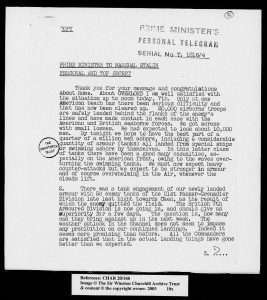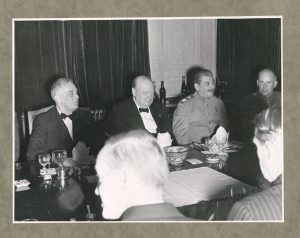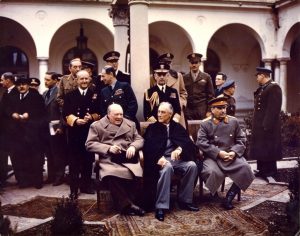
Finest Hour Extras
Churchill – Supervillain of Russian Propaganda
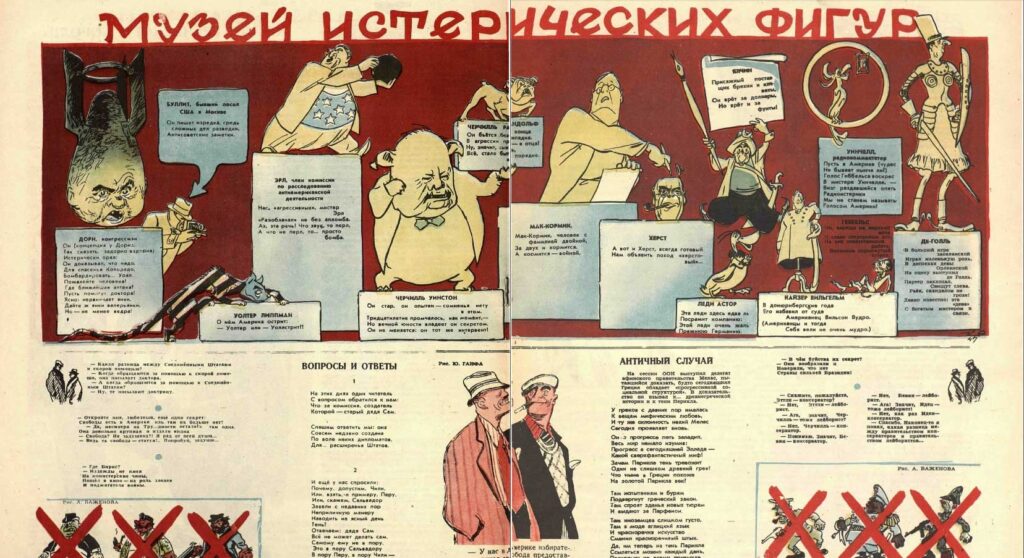
February 25, 2023
By Yuriy Umansky
Yuriy Umansky, a former journalist and Churchill’s biography researcher in Ukraine, now lives in Vancouver, B.C.
Churchill had hated Bolshevism since 1917, calling Vladimir Lenin “a culture of typhoid” smuggled into Russia. The Communists had no warm feelings for Churchill either. Leon Trotsky called him “a champion of capitalist violence” eager to choke proletarian masses struggling for their freedom.
On October 15, 1920, Lenin, speaking to local deputies of the Moscow region, put a propaganda stamp on Churchill – “the greatest hater of Soviet Russia”:

2025 International Churchill Conference
For several years the British War Secretary Churchill has been using all ways, both legal and even more illegal from the point of view of English laws, to support the White movement against Russia, in order to supply them with military equipment. He is the greatest hater of Soviet Russia…
Later, Stalin accused Britain of pushing the Soviet Union against Germany, and to move away from this fight itself. He said this in public in March 1939 at the congress of the Bolshevik Party. At the same time, Stalin did mention Churchill’s name in his speeches till March 1946 when Churchill delivered his famous “Sinews of Peace” speech in Fulton, Missouri.
Stalin was waiting for a couple of days for a reaction abroad to this speech. Then an article “Churchill Waves the Gun” by Yevgeny Tarle, a Russian historian and academician of the Russian Academy of Sciences, was published in the official newspaper of the Russian government Izvestia. Radio of Moscow also reported on Churchill’s speech “made in an exceptionally aggressive tone.” Next week under the same title, “Churchill Waves the Gun,” the official newspaper of the Communist Party of Russia Pravda (“Truth”) published on the first page a long commentary on Mr. Churchill’s Fulton speech:
He was the instigator of an anti-Soviet campaign and the chief organiser of armed intervention against Russia. Since then he apparently has forgotten nothing and learnt nothing. During the war, while mortal danger threatened Britain, he pretended to be a friend of the Russian people, but the danger passed and Churchill again became himself. He now ventilates his true sentiments, which, during the war, he painstakingly concealed.
A few days later, an interview with Stalin appeared in Pravda. He equated Churchill with Hitler and claimed that in Fulton’s speech he called on the West to go to war with the USSR, and also accused him of racism:
Mr. Churchill and his friends strikingly recall in this respect Hitler and his friends. Hitler began the task of unleashing war by proclaiming the racial theory, declaring that only people who spoke the German language constituted a full-fledged nation. Mr. Churchill, too, has begun the task of unleashing war with a racial theory, stating that only nations that speak the English language are full-fledged nations that are called upon to rule the destinies of the whole world…The English racial theory leads Mr. Churchill and his friends to the conclusion that the English-speaking nations, as the only full-fledged ones, should dominate the rest of the nations of the world.
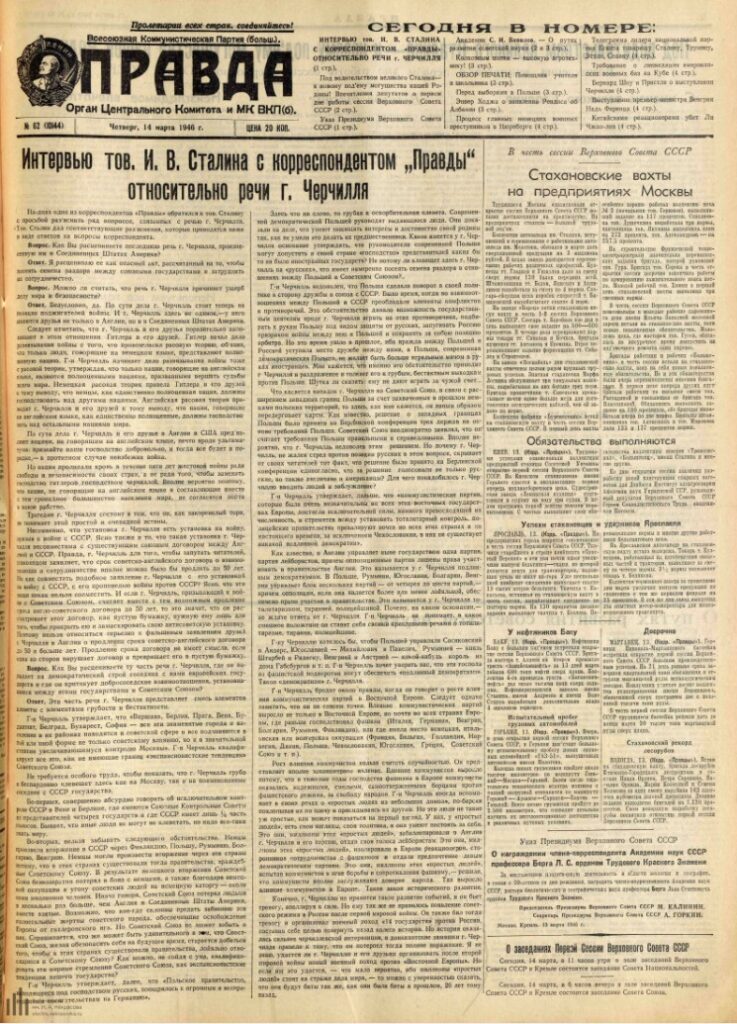
After that, Russian propaganda forgot about Churchill for a year and a half. The full power of its machine was directed at Churchill on September 18, 1947 after a speech of Andrey Vyshinsky, head of the Russian delegation to UNO General Assembly. His speech was called “For the Peace and Friendship of Nations, Against the Instigators of a New War.” Two days later the text of Vyshinsky’s speech was published in Pravda:
Churchill resorted to insinuations and slander against the Soviet Union. Churchill the father is echoed by his son who beat the record of war instigation in his statement made at Sydney on September 3. The family utterances of the Churchills by themselves would be of little interest to anybody, but they are an indicator of that black work which is being carried on in certain British circles against the cause of peace and which is directed to organizing a new war, no matter whether it is in the form of repeating Churchill’s military crusade against Russia or in any other form; the form is not important.
Pravda usually presented the official position of the Russian government and published it for regional and local leaders and for an external audience. Krokodil (Crocodile) was a popular satirical magazine published in Russia and was used for internal propaganda among ordinary people who are not good in politics.
Before Vyshinsky’s speech, Churchill never mentioned on the pages of Crocodile. After this speech the magazine printed only a small taunt note about the interview of Churchill-son to the Australian newspaper Daily Telegraph, in which he called his father a “clairvoyant”.
But the very next issue, on October 30, in honor of the 30th anniversary of the Russian revolution, became Churchill Sr.’s benefit performance. He appeared in a police helmet and with a baton in his hand. Further, in the article about the war instigators, Churchill was accused of supporting the opponents of the Bolsheviks during the Civil War in Russia. Then, in a large caricature of the “Museum of Hysterical Figures”, he was presented as an old vampire bulldog, and his son Randolph as a bulldog puppy.
From that moment, Churchill became the most popular supervillain in Crocodile, until he was displaced in the early 50s by a new terrible enemy – the American Uncle Sam.


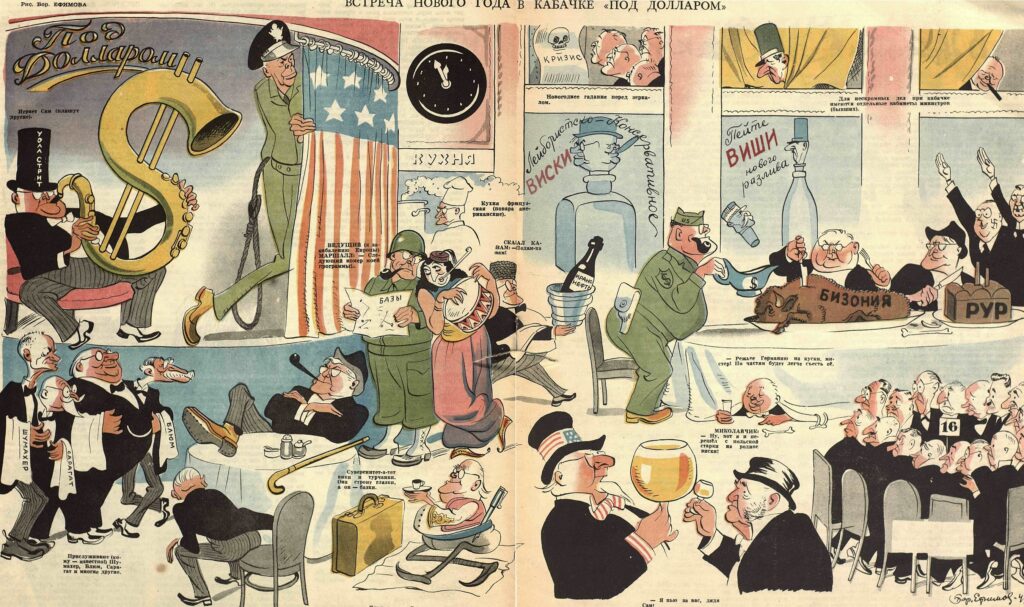

In 1951, when Churchill took office for the second time as prime minister, The Kukryniksy, who most frequently caricatured him in Crocodile, published an entire book with caricatures: Delusional “Anglo-Americanizers” dedicated to the developing Cold War.
The Kukryniksy (Russian: Кукрыниксы) were three caricaturists/cartoonists in the USSR with a recognizable style. “Kukryniksy” is a collective name, which is derived from the names of three caricaturists Mikhail Kupriyanov, Porfiri Krylov, and Nikolai Sokolov.
On 67 pages, the leaders and leading politicians of the United States, Europe, and the Far East were caricatured. Of course, the new-old British Prime Minister was on many pages. By the way, in 1960, during the Khrushchev Thaw period in Russia, the book was banned. Copies of the publication were subject to withdrawal from libraries and book trade.


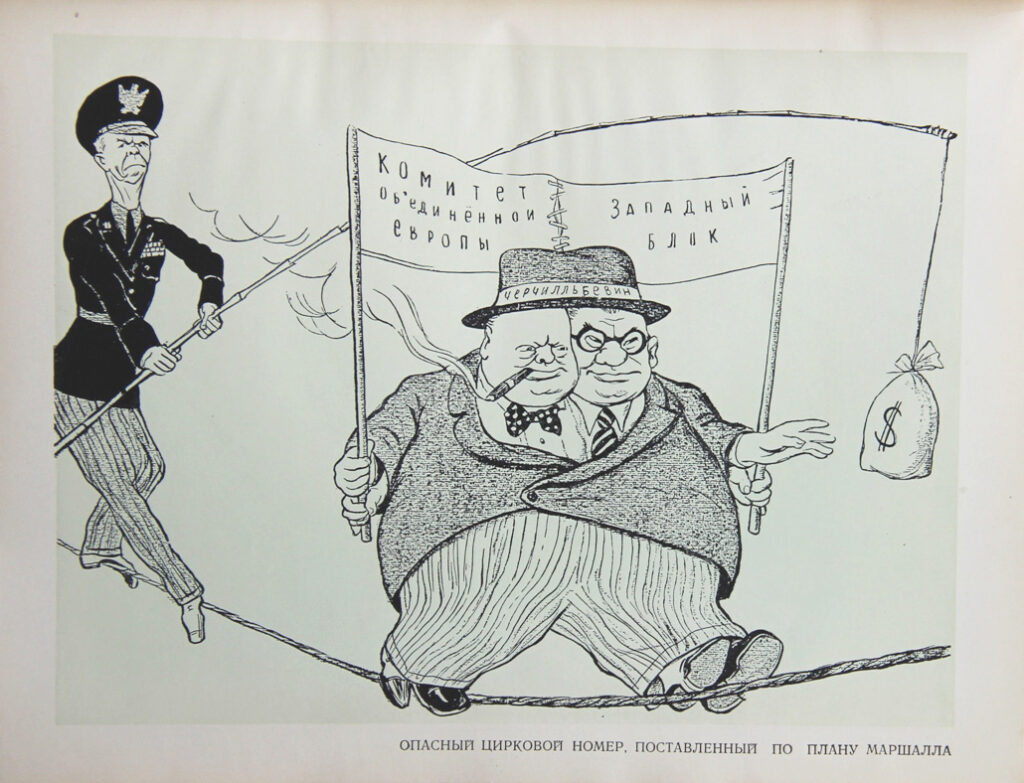
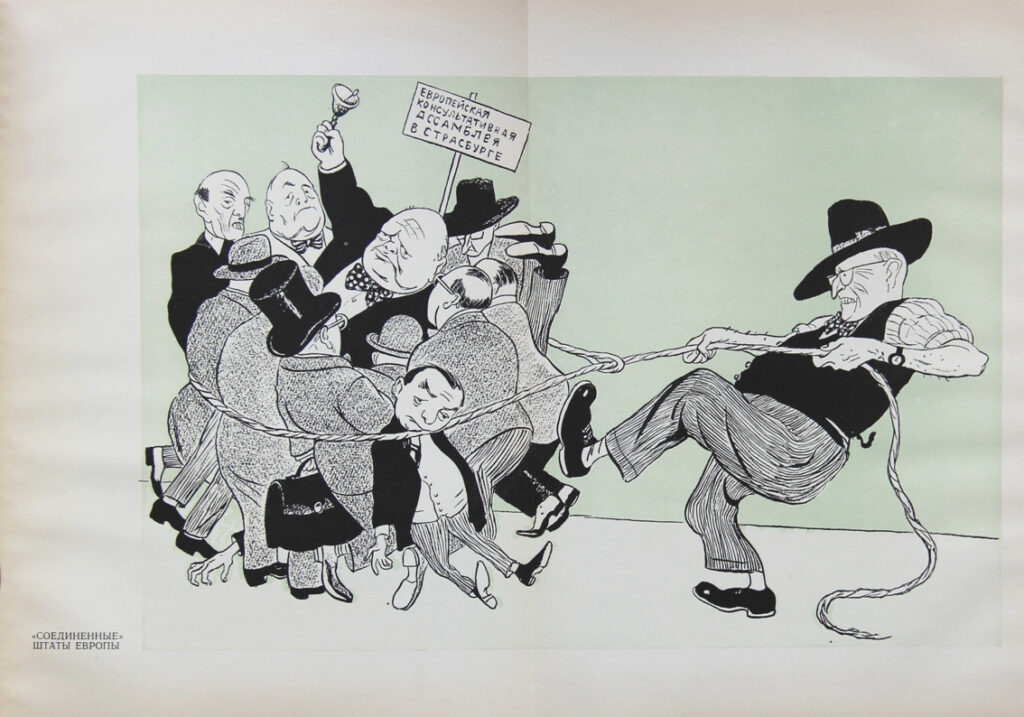
As Churchill left the post of prime minister and the Khrushchev Thaw began, he was forgotten by Soviet propaganda for several decades. After the annexation of Crimea in 2014, Russian propaganda began to use the theme of confrontation with the West more actively. Churchill’s caricatures of the Cold War times have again become in trend.
For example, a Russian state-owned news agency Sputnik in their article “No creativity. NATO again blames Moscow for “everything”” used the cartoon “Speech at Fulton”, 1947, by artist Boris Efimov.

HED Churchill’s Fake Quotes as a Weapon of Russian Propaganda
DEK In modern Russia, Churchill mainly used by politics and historians as an authoritative source of fake quotes to prove their theses. Now propaganda presented Churchill as a wise leader of one of the three superpowers that defeated fascism.
The canonical image of Churchill in modern Russia is the famous photo of the three leaders at the Yalta Conference. He is no longer a bulldog with vampire teeth, now he is a wise politician who has the needed quote for all occasions.
Most of them, as you understand, Churchill never said. Russian politicians, historians and ordinary people use many of Churchill’s quotes in Russian without checking whether the original source is in English (Churchill did not know Russian well enough to generate quotes in Russian:). I took some of Churchill’s well-known quotes in Russia and decided to check their authenticity.
On 28 May 2002 during the NATO Summit in Rome Russian President Vladimir Putin used a quote he attributed to Churchill:
Russia has never been as strong as it would like to be, but it has never been as weak as some people think
I could not find the original of this quote in English. I’m sure you won’t be able to either. Maybe only Putin’s speechwriter can find it.
Churchill’s fake quotes are sometimes used even by well-known Russian historians. Professor Igor Ilinskiy, the head of the Moscow University for the Humanities, one of the most authoritative Soviet and Russian historians and philosophers, a member of the Academy of Sciences, in his article in a popular Russian cultural and political newspaper “Literaturnaya Gazeta” September 16, 2015 in the anti-Western article “There is a war. Cold…” reflects on the ongoing confrontation between Russia and the West for many centuries.
In November 1964, Churchill was celebrating his 90th birthday in the English Parliament, and someone proposed a toast to him as Russia’s most ardent enemy. Churchill threw: “Unfortunately, there is a person who harmed the Soviets 1000 times more than I did. This is Nikita Khrushchev. Let’s clap for him!”
Journalists in Russia, like politicians and historians, also do not check the authenticity of Churchill’s quotes. In 2011, the Russian news and analytical agency Rosbalt, in the article “You need to be a little Stalinist,” argues that the current attitude towards Stalin in Russia is a national shame and disrespect for everyone. At the same time, the journalists decided to humiliate Khrushchev, who exposed Stalin’s personality cult, with Churchill’s “quote”:
Shortly before his death, talking about Khrushchev, Churchill said a very curious phrase: “Khrushchev is the only one politician in the history who declared war to a dead man. But not only that, he managed to lose it”
The origin of Churchill’s most famous “quote” in Russia is very interesting. It is most often used by sympathizers of Stalin. As I found, the original full quote is anti-Stalinist. In recent years, Russian state propaganda has been trying to create a positive image of Stalin, so this quote can often be heard on TV:
Stalin took Russia with a sap and left it with an atomic bomb
This quote became well-known in the Soviet Union in March, 1988 after an article “I can’t give up my principles”, by the Stalinist politician Nina Andreeva, where she used it. On the Russian Internet there are various false stories about the origin of this phrase. I spent some hours finding the primary source. Andreeva was inspired by a Polish Marxist writer and journalist Isaac Deutscher but changed the meaning of his words. In his work Russia After Stalin (1953), he wrote:
During a quarter of a century Stalinism, without compunction or pity and yet with some suppressed compassion, drove a nation of 160–200 millions to jump the chasm which separated the epoch of the wooden plough from that of the atomic pile. The jump is not yet completed. We cannot count the myriads which have landed on the farther side or those still left behind — or, even, those who have been made to jump to their destruction.
A few more popular “Churchill quotes”. The first two are even found on the English-speaking Internet, they are also fake:
I thought I would die of old age. But when Russia which fed the whole Europe with bread, began to buy grain, I realized that I will die laughing
Bolsheviks (or “Russians” in some other versions) create their own difficulties which they successfully overcame later
Only Lenin could lead the Russians out of the swamp where he led them
Russians are so accustomed to the Cold War that they are unlikely to be able to conduct international relations in any other form.
Slavic essence of the Slavs (“the slave mentality of Slavic peoples”) is ineradicable. They had a dictator from the Caucasus, then from Ukraine.
And alsoone Russian political joke about Churchill. In the Soviet period political jokes were a form of social protest used by people in private talks. In this way they could mocking and criticising leaders, the system and its ideology, myths and rites. In these jokes Soviet leader Leonid Brezhnev was depicted as dim-witted, senile, always reading his speeches from paper, and prone to delusions of grandeur.
During Brezhnev’s visit to England, Prime Minister Thatcher asked the guest, “What is your attitude to Churchill?” “Who is Churchill?” Brezhnev said. Back in the embassy, the Soviet envoy said, “Congratulations, comrade Brezhnev, you’ve put Thatcher in her place. She will not ask stupid questions anymore.” “And who is Thatcher?” Brezhnev said.
And here is one real quote by Churchill, which is very suitable for any totalitarian propaganda, including Russian:
“The machinery of propaganda may pack their minds with falsehood and deny them truth for many generations of time. But the soul of man thus held in trance or frozen in a long night can be awakened by a spark coming from God knows where and in a moment the whole structure of lies and oppression is on trial for its life.” — MASSACHUSETTS INSTITUTE OF TECHNOLOGY, 31 MARCH 1949
HED ‘Churchill’s House’ in Crimea
DEK The figure of Churchill in Russia is more mythical than historical or political. Therefore, it is not surprising that there are many myths around his name. Most of them are the complete fantasy of Russian historians and journalists, but some have real grounds.
‘Churchill’s House’ in Simferopol, Crimea is located at 15 Schmidt str., around the corner from my secondary and higher school. During my school years, I passed by this house several times a day. I trained to read from the plaque on the house, the text of which I knew by heart:
In this building on February 3, 1945, during the preparation of the Crimean (Yalta) conference of the three allied powers of the anti-Hitler coalition, the head of the British delegation, Prime Minister W. Churchill, stopped for a short rest
After university, I became a journalist, studying local history became my passion. My passion for Agatha Christie detective stories as a child, plus my fact-checking skills in journalism, eventually led me to the genre of historical investigations. I took known facts from local history and checked them, discarding many falsifications and adding facts that I discovered. I published the results of my historical research in the local press, made documentaries for local TV channels. I tried to popularize the History.
As an adult, I often drove past Churchill’s house. And one day I noticed a plaque familiar to me since childhood. The information on it has always seemed an axiom. But I decided to check this well-known fact.
A search in Russian-language sources showed a strange thing. All quotes were word for word similar to each other. I quickly discovered a primary source. In 1995, the unofficial details of the Yalta Conference were published in the book “The Crimean Conference of 1945. Memorable Places” by the Crimean historian and local historian Vladimir Gurkovich. The local historian collected evidences of participants in the events still alive at that time: guards of the secret police, cooks, waiters, pilots. In this book, among other things, Gurkovich tries to answer the question why the US President Franklin D. Roosevelt got from the Saki airport to Yalta in 6 hours, and Churchill wrote in his memoirs that the journey took 8 hours:
Let us give the floor to the veteran of state security L. A. Utkin, who in 1945 served in the 8th department and on February 3 took part in guarding the building at 15 Schmidt Street: “On this day, around lunchtime, Winston Churchill and several people from his escort drove up in five or six cars. The guards were in the open “Willis”. I remember that among the cars there were Soviet ZIS-101. In my opinion, it was in one of these cars that Churchill came. The fact is that when the cars stopped, the guards first jumped out, and then the passengers got out. Among the latter was Winston Churchill in a military coat and uniform cap. The same outerwear was worn by some other Englishmen. Therefore, I did not notice the moment of Churchill’s exit from a particular car. I think that the British Prime Minister deliberately wore a paramilitary uniform so as not to stand out among those around him. As a professional, I will say that the very exit from the cars (security, and then the passengers) was worked out perfectly. I note that the guards were mixed – ours and the British. My task and the people entrusted to me from the external cordon were to control a certain sector from the Schmidt str. By the way, an anti-aircraft battery was installed not far from the guest house. It was in the experimental garden of the Agricultural institute where the Children’s Park is now.
What happened in the house, I can’t say, since I didn’t come closer to the fence to the building. Guards in the yard and building were carried by state security officers from Moscow. I didn’t have any contact with them. Neither in February 1945, nor later. I confess that it was not customary for us to show excessive curiosity.
I can say that Churchill was in the building for no more than an hour. I saw him go out on the balcony with a cigar for a few minutes. He took a few puffs, looked at the sky, to the right, to the left. And, standing at the balcony railing, he spoke a few phrases with the people of his delegation.
While Churchill was in the building, the vehicles turned 180 degrees towards the Vorovsky str. And then security came out of the house and a small compact group of British. Unfortunately, I could not see which car Churchill himself got into.”
It is noteworthy that many Simferopol residents heard that W. Churchill stayed in their city. However, over many years of searching, the author managed to meet with only one direct participant in the events that took place on February 3, 1945 on a quiet Schmidt street, who answered the question: why did F. Roosevelt reach the South Coast of the Crimea in six hours, and W. Churchill about eight.
This beautiful legend of Gurkevich was liked by the famous Crimean historian, former deputy for science of the Livadia Palace, Professor Sergei Yurchenko. He included a quote from security guard Utkin in his book “The Yalta Conference of 1945. Chronicles of the Creation of a New World.” Yurchenko is one of the most respected scientists in the Crimea, so his book legalized the guard’s story as a historical fact and was repeatedly cited by other historians in their studies, and journalists in their materials. By the way, Yurchenko is the author of a schoolbook on the history of Crimea for students.
In 2022, I visited Yurchenko in Simferopol at the university where he works as Vice-Rector for International Relations. He could not provide me with any evidence of Churchill’s stay in Simferopol in this mansion in 1945, except for the words of Utkin from Gurkevich’s book.
When I realized that the facts mentioned in the plaque on “Churchill’s house” are confirmed by only one unreliable source, there are no other facts confirming or denying this information in Russian-language sources, I turned to open English-language sources in Internet and documents from the Churchill Archives Centre at Churchill College.
There I discovered that Churchill Really stayed in Simferopol. Not in February 1945, but four months earlier, on October 19, 1944. This day is described in details in Elizabeth Layton’s book “Mr. Churchill’s Secretary” (1958):
Off we flew, and then occurred the most memorable of my own adventures.
‘We were to fly across the Mediterranean to Cairo, as the Turks would not allow us to use their air, and in view of this long hop and the importance of the cargo, the aircraft were to be serviced as well as refuelled in the Crimea. Accordingly, we came down near a tiny place called Simferopol. The Germans had left these parts only four or five months previously and, having scorched the earth, had left ruin and desolation behind them. However, a small house in Simferopol had been put in order as a resting-place for the Prime Minister and the principals of his party, and during the afternoon they congregated there. Besides Mr. Churchill there were Mr. Eden, Sir Alan Brooke, General Ismay, Lord Moran, General Jacob, and various Foreign Office and War Office advisers, as well as the P.M.’s staff of Mr. Martin, Detective-Inspector Hughes, Sawyers and myself. That evening they were to be entertained to a banquet, the trappings of which had been flown from Moscow that day; the hosts were to be the Mayor of the Soviet of Crimea and one General Yermetchenko of the Russian Naval Air Force, accompanied by interpreters.
Dinner-time came, and Mr. Churchill said that Inspector Hughes, Sawyers and I must go in to dinner with the main party, there being no separate dining-place for us. Fortunately, we found a small table and sat together.
It was an amazing scene, like something out of Hans Andersen. Lit only by candles, and we were served by fresh-faced Russian girls, obviously hastily thrust into waitresses’ uniform, wearing unaccustomed high heels on which they tottered round awkwardly. Course succeeded course, the air became wavy with cigar smoke, the candles guttered, the vodka flowed. Looking around at the scene I thought, “This could never happen again.” Soon toasts and speeches began. There was a toast to The King, then one to Marshal Stalin; one to the Red Air Force, and one in reply to the Royal Air Force. Then I saw Mr. Churchill looking at me with a wicked twinkle, and wondered what was going to happen. He rose to his feet and proposed the health of “Miss Layton, the only lady present”, at which all that grand company got good-naturedly to its feet laughing, and drank the toast. General Yermetchenko seized the flowers out of a bowl on the table and dumped them, dripping, into my lap, by way of a bouquet, and then the company called for a speech. Feeling fairly idiotic and scarlet-faced, I stood up and said, “Thank you very much, I feel greatly honoured”, and sat down again hastily, which someone was afterwards kind enough to tell me was “the perfect speech, neither too long nor too short”. Soon the after-dinner speeches began in earnest, and very amusing they were.
But the evening was not yet over. When the party left the tables, the gallant General Yermetchenko indicated that he wished me to accompany him to an adjoining room. I felt anxious, wondering what were the after-dinner customs in these parts. I called Inspector Hughes, but the General waved him away. He then indicated that we were to drink to Anglo-Soviet relations, and produced two tumblers of red wine, which on his instructions we drank “bottoms up”, I rather innocently thinking I should humour him. However, the tumblers were then refilled, and we “bottomed up” a second time. Fortunately, I was then rescued by Mr. Martin, who put his head round the door and, seeing the party threatening to become a bit merry, decided I had better now return to the aircraft
That evening made a good story for those in Whitehall, who found the adventures of the Prime Minister’s Young Ladies a source of amusement!
Field Marshal Lord Alan Brooke in his “War Diaries, 1939-1945” also left memories about this day, October 19, 1944:
We had a cloudy flight down and did not see much of the ground till we crossed the sea leading into the Crimea, We landed at Sarabus aerodrome at 3.30 pm and were met by the Commissar for the Crimea and the Admiral commanding the local ground and air forces. We were given cars and driven off to Simferopol, about an hour’s drive. There a house had been prepared for us to rest and feed in. PM remained there for a sleep, whilst Eden, Ismay and I and rest of party drove off into the mountains towards Yalta to see the country. Unfortunately there was not sufficient time to reach Sebastopol, but we were able to form a good general idea of the country. The main impression I gained is that the Crimea is far more prosperous than the rest of Russia that we saw. Houses better, clothes better, and general impression of more amenities of life.
‘The Commissar told us that the population had been 1 million, but was reduced to 500,000 by the Boche, and they were forced at present to introduce additional population from Russia. We returned to our house at Simferopol by about 7 pm for a vast dinner, accompanied by a series of toasts as usual. Finally we returned to the aerodrome and took off at 1 am for Cairo. I wish we had had time to see Sebastopol and the country round it.
Madelin Evans, an Archivist at the Churchill Archives Centre, found description of this day in the Papers of Sir John Martin, a Principal Private Secretary to the Prime Minister, Winston Churchill, during World War II:
After an uneventful flight mostly above the clouds, though at one point we had a glimpse of the Dnieper, we landed at Sarabiz in the Crimea in the afternoon. The local Commissar and the Naval Air Force C O met us on the field and took us to a buffet, where a long table was groaning with the usual caviare and cold meat etc and bottles. We had just had a hearty lunch on the plane and even politeness could not enable us to do more than drink toasts, which they pressed us to do in the local vintages. We then drove along an exceedingly rough road to Simferopol, where a house had been got ready for our reception. While the PM rested some of us drove south towards the mountains between us and the Black Sea. It was a beautiful evening and the country looked most attractive in the soft lights of sunset. It is a remarkably Grecian landscape: I am sure Iphigenia must have felt quite at home in the Crimea. The peasants are an extremely comely and pleasant looking crowd. They gave an appearance of wellbeing much superior to that seen in the streets of Moscow. In Simperofol they were well dressed and seemed relatively prosperous and happy, in spite of the ravages of war, visible on every hand.
Dinner at Simferopol was the usual immense affair, not omitting the sucking pig. The Commissar and Commander dined with us and there were the usual toasts.
Preparations for the landing of Churchill’s plane in Simferopol were discussed in the correspondence between Churchill and Stalin.
Secret Message from Mr Churchill to Marshal Stalin: So long as we can get down safely to refuel if necessary at Simferopol or at any other operational landing ground on the coast which you may prefer… October 4th, 1944
From Premier J. V. Stalin to the Prime Minister, Mr W. Churchill: Your message of October 4 received. Landing arranged at the Sarabuz air field near Simferopol. Direct your signal aircraft thither. October 5, 1944
In Vyacheslav Molotov’s papers I found documents on the preparation of Simferopol and Baku as places for a possible landing of the Prime Minister’s plane. Molotov’s deputy Andrey Vyshinsky wrote to Archibald Clark Kerr, British Ambassador to the Soviet Union, that the Soviet government had given instructions to set up a temporary Anglo-Soviet flight control station near Simferopol. On October 6, Molotov informed Ambassador Kerr that all necessary measures had been taken in case the Prime Minister’s plane landed in Simferopol or in Baku.
On the next day after leaving Crimea Churchill wrote in his Personal Message to Marshal Stalin:
Russian hospitality, which is renowned, excelled itself on the occasion of our visit. Both in Moscow and in the Crimea, where we spent some enjoyable hours, there was the highest consideration for the comfort of myself and our mission. I am most grateful to you and to all those who were responsible for these arrangements.
It is impossible to state with certainty that Churchill was in this particular mansion in Simferopol. There is no address or description of the way in the memories. But this house at that time was used as a guest house of the Crimean government and was one of the few houses in good condition after the liberation of Simferopol from German troops in April 1944.
The question of the Crimean historian Gurkevich why Churchill went to Yalta two hours longer than Roosevelt can be answered by a piece from Sarah Churchill’s autobiography:
“Keep on Dancing”. February 3, 12:20
…We were at the rest house. Papa and I clambered out for what we thought would be a short pause. We were led into a small room – groaning with food and wine – and a smiling Molotov. From there on we never looked back and the frozen countryside melted and became quietly friendly. I even noticed that there were a few Cypress trees and that the Black Sea was quite blue. The Americans would not stop – they decided to hurry on… After about 1,5 hours, we took to the road again. We still had another two hours to go but these were enjoyable.
Sarah did not mention where the guest house was located. But it is known from Soviet documents that Stalin’s dacha “Dove” in Alushta, on the southern coast of Crimea, was chosen as a place for rest and lunch for the British and American delegations. There are many Cypress trees around this house even today; it has a good view at the Black Sea. The road to the Vorontsov Palace in Alupka, the residence of the British delegation, at that time took about two hours from that place.
By the way, the Prime Minister’s wife Clementine also visited the “Churchill House” in Simferopol six months later.
We have left Yalta and are in the train on the way to Odessa. We had a lovely drive to Simferopol where before joining our train we dined with the major who entertained you and at the same house. He sent you and Sarah his greetings. Love Clemmie – The papers of Clementine Churchill (Churchill Archives Centre, file reference CSCT 1/29), from 1st May 1945.
Subscribe
WANT MORE?
Get the Churchill Bulletin delivered to your inbox once a month.

